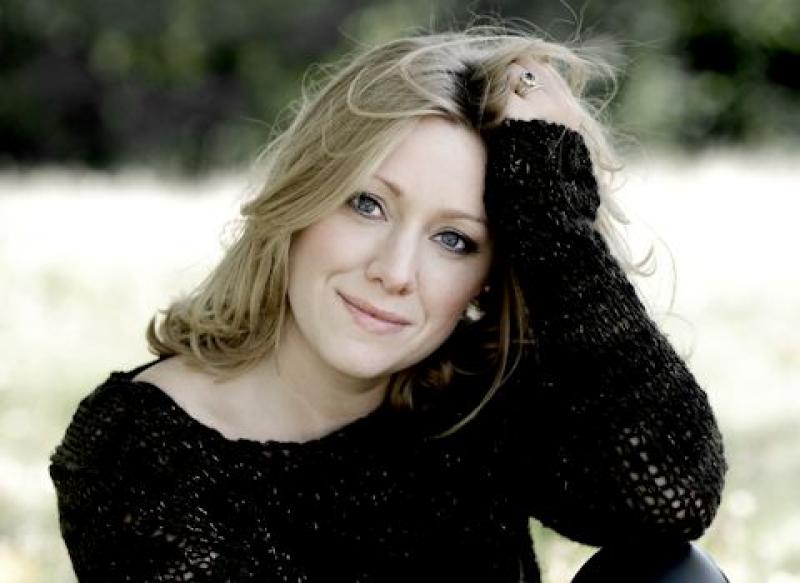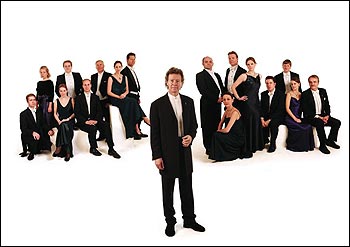Jephtha, The Sixteen, Christophers, Barbican | reviews, news & interviews
Jephtha, The Sixteen, Christophers, Barbican
Jephtha, The Sixteen, Christophers, Barbican
A vivid, operatic performance of Handel's final oratorio

You really think they’d have learned by now. Any operatic vow to sacrifice the next living creature you see in return for salvation will reliably end up with the luckless suppliant faced with their lover/son/spouse. For those who haven’t already learned this handy lesson from Mozart’s Idomeneo, there’s Handel’s Jephtha. Its skeletal (and frankly rather daft) plot matters little, however.
There’s a gloss to The Sixteen’s sound that’s particularly distinctive in their performances with orchestra. It’s the rounder, softer-edged cousin of the gut-and-fury Italianate texture that characterises so many European early music ensembles, and makes everything it touches beautiful. Sometimes this can risk dissolving drama into abstract loveliness, but with a piece like Jephtha that is more about subtle gradations of contemplation than action it works well.
The pianissimo Gilchrist found for the da capo had a full audience in thrall
Handel’s last oratorio is the summation of a career of exploring melodic psychology, and the touchstone of any performance is the excruciatingly exquisite “Waft her, Angels”, sung by Jephtha as he prepares to sacrifice his daughter Iphis. James Gilchrist brought Evangelist-like directness to it, and was shattering in his simplicity. There’s nowhere to hide in the arching, rising lines that ascend even as they so desperately hope their subject will. The pianissimo he found for the da capo had a full audience in thrall, not least for its contrast to the thunder and power he had delivered only moments earlier.
Sophie Bevan’s Iphis was no less impressive, delivering controlled delicacy in “Farewell, ye limpid springs”, and folk-like, lilting charm for “Take the heart”. Balance in the hall was oddly stacked in favour of the orchestra, and Bevan emerged best among the soloists, swelling into generous sweetness at the top of the voice. A less obvious bit of casting was Susan Bickley’s Storgé. She may have a voice capable of adapting to unusually diverse repertoire, but that doesn’t mean she excels equally across all of it. I adore her in Janáček or contemporary repertoire, but here it was hard to look past the jolting gear shift into chest voice, and the rather colourless tone and uncherished recitative as she held back her full force.
 It was good to see Robin Blaze back on the concert platform, radiating joy and personality. His voice has acquired a little more husk than it once had, but like the tone of a baroque flute it’s a rather attractive quality in this music, and he still has all his old agility when it comes to coloratura, deftly weaving his way through some of the more athletic writing of the piece. Christophers’s direction kept things moving throughout, but even at fairly perky speeds we could have done with a little more heft from The Sixteen. Their grieving choruses were models of careful detail and ensemble, but among so much generous orchestral playing they were a little lost in moments of climax.
It was good to see Robin Blaze back on the concert platform, radiating joy and personality. His voice has acquired a little more husk than it once had, but like the tone of a baroque flute it’s a rather attractive quality in this music, and he still has all his old agility when it comes to coloratura, deftly weaving his way through some of the more athletic writing of the piece. Christophers’s direction kept things moving throughout, but even at fairly perky speeds we could have done with a little more heft from The Sixteen. Their grieving choruses were models of careful detail and ensemble, but among so much generous orchestral playing they were a little lost in moments of climax.
Christophers and his musicians (pictured above) will soon be recording Jephtha, and it will be interesting to hear which artists flourish in the studio and which worked better in concert context. I suspect Blaze’s performance on disc will be well worth a listen, and Bevan’s Iphis is definitely a keeper.
rating
Explore topics
Share this article
The future of Arts Journalism
You can stop theartsdesk.com closing!
We urgently need financing to survive. Our fundraising drive has thus far raised £49,000 but we need to reach £100,000 or we will be forced to close. Please contribute here: https://gofund.me/c3f6033d
And if you can forward this information to anyone who might assist, we’d be grateful.

Subscribe to theartsdesk.com
Thank you for continuing to read our work on theartsdesk.com. For unlimited access to every article in its entirety, including our archive of more than 15,000 pieces, we're asking for £5 per month or £40 per year. We feel it's a very good deal, and hope you do too.
To take a subscription now simply click here.
And if you're looking for that extra gift for a friend or family member, why not treat them to a theartsdesk.com gift subscription?
more Classical music
 Monteverdi Choir, ORR, Heras-Casado, St Martin-in-the-Fields review - flames of joy and sorrow
First-rate soloists, choir and orchestra unite in a blazing Mozart Requiem
Monteverdi Choir, ORR, Heras-Casado, St Martin-in-the-Fields review - flames of joy and sorrow
First-rate soloists, choir and orchestra unite in a blazing Mozart Requiem
 Cho, LSO, Pappano, Barbican review - finely-focused stormy weather
Chameleonic Seong-Jin Cho is a match for the fine-tuning of the LSO’s Chief Conductor
Cho, LSO, Pappano, Barbican review - finely-focused stormy weather
Chameleonic Seong-Jin Cho is a match for the fine-tuning of the LSO’s Chief Conductor
 Classical CDs: Shrouds, silhouettes and superstition
Cello concertos, choral collections and a stunning tribute to a contemporary giant
Classical CDs: Shrouds, silhouettes and superstition
Cello concertos, choral collections and a stunning tribute to a contemporary giant
 Appl, Levickis, Wigmore Hall review - fun to the fore in cabaret and show songs
A relaxed evening of light-hearted fare, with the accordion offering unusual colours
Appl, Levickis, Wigmore Hall review - fun to the fore in cabaret and show songs
A relaxed evening of light-hearted fare, with the accordion offering unusual colours
 Lammermuir Festival 2025, Part 2 review - from the soaringly sublime to the zoologically ridiculous
Bigger than ever, and the quality remains astonishingly high
Lammermuir Festival 2025, Part 2 review - from the soaringly sublime to the zoologically ridiculous
Bigger than ever, and the quality remains astonishingly high
 BBC Proms: Ehnes, Sinfonia of London, Wilson review - aspects of love
Sensuous Ravel, and bittersweet Bernstein, on an amorous evening
BBC Proms: Ehnes, Sinfonia of London, Wilson review - aspects of love
Sensuous Ravel, and bittersweet Bernstein, on an amorous evening
 Presteigne Festival 2025 review - new music is centre stage in the Welsh Marches
Music by 30 living composers, with Eleanor Alberga topping the bill
Presteigne Festival 2025 review - new music is centre stage in the Welsh Marches
Music by 30 living composers, with Eleanor Alberga topping the bill
 Lammermuir Festival 2025 review - music with soul from the heart of East Lothian
Baroque splendour, and chamber-ensemble drama, amid history-haunted lands
Lammermuir Festival 2025 review - music with soul from the heart of East Lothian
Baroque splendour, and chamber-ensemble drama, amid history-haunted lands
 BBC Proms: Steinbacher, RPO, Petrenko / Sternath, BBCSO, Oramo review - double-bill mixed bag
Young pianist shines in Grieg but Bliss’s portentous cantata disappoints
BBC Proms: Steinbacher, RPO, Petrenko / Sternath, BBCSO, Oramo review - double-bill mixed bag
Young pianist shines in Grieg but Bliss’s portentous cantata disappoints
 theartsdesk at the Lahti Sibelius Festival - early epics by the Finnish master in context
Finnish heroes meet their Austro-German counterparts in breathtaking interpretations
theartsdesk at the Lahti Sibelius Festival - early epics by the Finnish master in context
Finnish heroes meet their Austro-German counterparts in breathtaking interpretations
 Classical CDs: Sleigh rides, pancakes and cigars
Two big boxes, plus new music for brass and a pair of clarinet concertos
Classical CDs: Sleigh rides, pancakes and cigars
Two big boxes, plus new music for brass and a pair of clarinet concertos
 Waley-Cohen, Manchester Camerata, Pether, Whitworth Art Gallery, Manchester review - premiere of no ordinary violin concerto
Images of maternal care inspired by Hepworth and played in a gallery setting
Waley-Cohen, Manchester Camerata, Pether, Whitworth Art Gallery, Manchester review - premiere of no ordinary violin concerto
Images of maternal care inspired by Hepworth and played in a gallery setting

Add comment